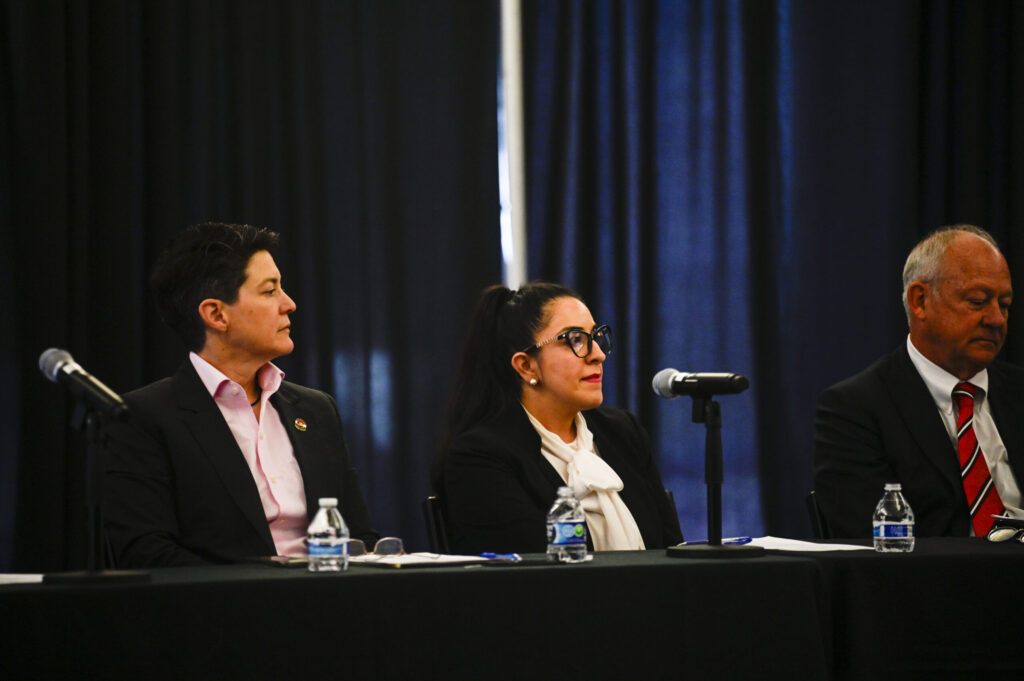Colorado’s judicial discipline panel works on emergency rules in wake of voter-approved amendment
The body charged with crafting new protocols for judicial discipline in Colorado discussed at length the need for emergency rules last week, following through on a constitutional amendment voters enacted in November to revamp the process of disciplining state judges.
Kristen L. Mix, the chair of the Judicial Discipline Rule-Making Committee, said the bulk of the March 20 meeting centered on whether and how to adapt the existing rules to the new procedure. She also suggested the phrase “existing rules” may not be accurate, as the passage of Amendment H in 2024 might have actually repealed the prior discipline rules.
“I think the committee is generally of the consensus that they did lapse and that the way Amendment H is worded, it requires the enactment of new rules,” Mix said. “On the other hand, even though they lapsed, there certainly isn’t anything in Amendment H that indicates that they are forever banned from being used.”
The rule-making committee’s meeting was not open to the public, but Mix agreed to speak to Colorado Politics about what took place. She informally characterized the gathering as an “administrative” meeting for the committee to organize itself and decide how it was going to draft new rules. The committee also received legal advice and considered how to handle judicial disciplinary issues that arise before new rules can be enacted.
Mix anticipated the committee will transition to conducting substantive meetings about the rules themselves, which will be public. She hoped the discussions will be streamed online, but did not commit to doing so. In the meantime, a subcommittee is handling the work of proposing emergency rules.
“I’m not sure we’re going to wait to have a full and final set of complete rules to govern all judicial discipline proceedings in the state in the future before we sit down as a group and decide if these rules are going to be sufficient and invite public comment and give notice and all that,” she said. “My sense is we would probably do it more on a step-by-step basis so that we can get some things in place as soon as we possibly can.”
The legislature referred the amendment to the 2024 ballot following a series of committee hearings. The changes to judicial discipline reduced the role of the Supreme Court, enabled information-sharing about judges’ alleged misconduct to occur sooner and more widely, and established the 13-member rule-making committee. Among the members of the committee are Justice Richard L. Gabriel, executive director Anne Mangiardi of the Colorado Commission on Judicial Discipline and Presiding Disciplinary Judge Bryon M. Large.
Mix is formerly a federal magistrate judge who spent 16 years on Colorado’s U.S. District Court before her retirement in 2023. During her March 12 confirmation hearing before the state Senate Judiciary Committee, she told lawmakers the role of the rule-making committee is to restore integrity to the judicial discipline process.
“I see the work of the commission as being a team effort to ensure with transparency, with openness, with accountability to the public and to the legislature, that those roles are accomplished,” Mix said.
She told Colorado Politics that she also believed she could bring to the rule-making committee a perspective on how judges make decisions and run their chambers.
Mix mentioned the committee will need to receive advice about how to handle the records of its non-public “administrative” meetings, but otherwise the committee will likely follow the process other state agencies use for notifying the public and inviting comment about proposed rules.
“There were a lot of comments about what the existing rules say and don’t say and the language that would have to be adjusted and that kind of thing,” Mix said about the most recent meeting. “But the philosophical underpinning of the whole discussion was, should we or should we not look at those rules as a basis for a starting point?”
She raised the example of the prior disciplinary process using special masters — panels of three judges — to hear evidence. The new procedure scraps that concept and instead relies on an adjudicative board, with a pool of judges, attorneys and non-attorneys, to fulfill that role.
Mix noted Amendment H does not contain a deadline by which the committee must pass new rules. However, the provision creating the rule-making committee also establishes that the body’s rules will apply to formal disciplinary proceedings beginning on April 1.
“I think it’s probably unlikely, to be honest with you, that we’re gonna have a pronouncement to make by April 1,” she said. “Everybody understands the urgency. Everybody understands that this is an important mission and that we want to meet the legislative mandate as quickly as we can. On the other hand, everybody understands that this kind of business takes time.”
The committee’s meetings will occur on the third Wednesday of every month, with the next one scheduled for April 16. Mix said the judicial discipline commission has created a page on its website for the rule-making committee, where updates will be posted.














